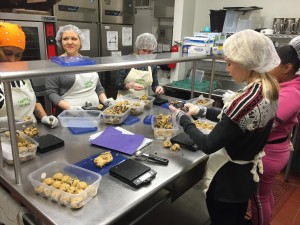
Together We Bake participants create chocolate chip cookies to sell at Whole Foods, a farmers market and other places.
Alexandria, Va., nonprofit Together We Bake takes women who need a second chance and turns them into job ready candidates.
Its recipe: combine lessons in making chocolate chip cookies, granola and other goodies with experience doing inventory and making deliveries. Add a bit of confidence building and employment counseling. And provide ServSafe training, so participants graduate with a nationally recognized certification.
The program began in 2012 after former social worker Stephanie Wright and her running buddy, Tricia Sabatani, who previously worked with seniors and had a home-baked cookie business, discussed a variety of ventures and settled on Together We Bake.
Why they do what they do
“We wanted to help other people and started looking at our community, asking what was missing, what services were not being provided by the government or other organizations,” says Wright. “We quickly realized that job training was one of them.”
Over the past four years, the mostly previously incarcerated women have experienced an employment rate of 60% and even more impressive recidivism rate of just 6%.
Participants range in age from 22 to mid-60s, but the average age is about 40.
Together We Bake offers three classes each year, with 10 to 12 women in each class. The program takes place on Tuesdays, Wednesdays and Thursdays from 9 a.m. to 1 p.m. There are no strict requirements to participate.
“There’s no type of educational requirement, and a criminal background doesn’t matter,” says Wright. “We’re looking for them to make a commitment to the program and be wiling to do some hard work and some self work. They also must be willing to change their path and stay on a positive path.”
The way Together We Bake works
At the beginning of the day the women share something that’s empowering to them in a sort of confidence building exercise before the work begins. Participants work on teams. The business team does inventory, makes deliveries or whatever else is required at any particular time. When they deliver to Whole Foods, one of Together We Bake’s biggest accounts, the women get to stock the shelves and talk to the grocery manager.
The rest of the participants are in the kitchen on the baking team, the cleaning team and the prep team. After about two or three hours of work, the women participate in groups emphasizing empowerment, life skills, communications, goal setting and anger management.
The empowerment group is based on the Houses of Healing and Beyond Trauma curriculums.
“These are great resources that cover the subjects that we needed,” Wright says. “We’ve made it our own and picked the things that work for us. The woman who runs the empowerment groups is one of our graduates and has built some things into the program that she thinks are important from her own experiences being incarcerated.”
Together We Bake participants also take the National Restaurant Association Foundation’s ServSafe Food Safety Training Program, so they can be certified to do food service work.
Outside professionals conduct a two-session financial literacy group, in which the women learn budgeting and banking. They also pull their credit scores and practice making phone calls to creditors to explain their situation in order to boost their confidence so they will be able to rebuild their credit.
In addition, participants work with volunteers in the community selling the products they make at the local farmers market.
High completion rate
The program’s completion rate is 83 percent, and when people drop out it’s for serious reasons, according to Wright.
“One of the participants got pregnant and was really sick. Another’s son got arrested, and she needed to stay home and take care of his child. We only terminated one person from the program because of issues and it was an attitude issue,” she says.
In addition to the training and education, Together We Bake participants are matched with local job counselor volunteers, who work one on one with the women to help them develop a resume, learn interviewing skills and practice completing online applications.
“It gives them extra support and helps them when they feel rejected because things don’t go their way,” Wright says.

